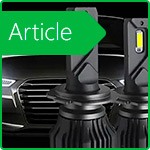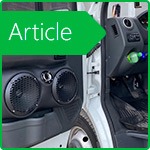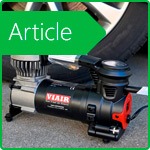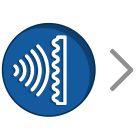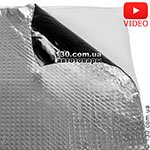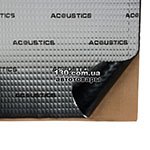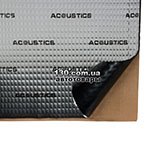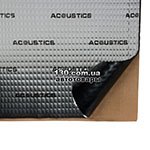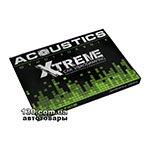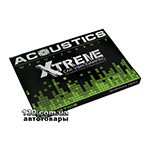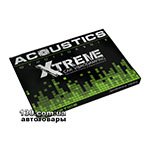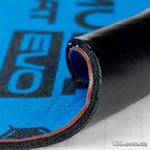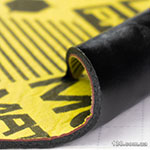Vibro-isolation
Selection of goods by parameters
Hide filters
Found 39 item(s)
Vibro-isolation: Best sales
|
Vibro-isolation: Frequently Asked Questions
What is car vibration isolation?
Car vibration isolation is the process of installing special materials on the car body to reduce vibrations and noise from the engine, road and other sources.
Why is car vibration isolation important?
Vibration isolation increases interior comfort by reducing noise and vibration, improving acoustics, and also protects against corrosion.
Can I install vibration isolation on my own?
Yes, you can, but it is recommended that you contact professionals for the best results.
What parts of the car need to be vibration proofed?
Typically, vibration isolation is applied to the doors, floor, roof, hood, trunk and wheel arches.
Will vibration isolation affect the weight of the car?
Yes, vibration isolation increases the weight of the car, but it is usually a minor increase that does not affect its performance.
Can vibration isolation be combined with noise insulation?
Yes, vibration isolation and noise isolation are often used together to maximize the effect of noise and vibration reduction.
How often should vibration isolation be renewed?
Vibration isolation does not require regular renewal if it has been installed properly. Materials retain their properties throughout the life of the car.
How does vibration isolation affect the acoustics in the cabin?
Vibration isolation improves acoustics by reducing vibrations and extraneous noise, allowing the sound system to work more efficiently.
Can vibration isolation be used in winter conditions?
Yes, quality vibration isolation materials retain their properties even in extreme temperature conditions, including winter conditions.
Does vibration isolation affect fuel efficiency?
The effect of vibration isolation on fuel efficiency is minimal and hardly noticeable.
What are the best materials for door soundproofing?
For doors, 2-3 mm thick vibration isolators and 5-8 mm thick noise-absorbing materials such as bituminous mats and acoustic foam are suitable.
What materials are best for car floor noise insulation?
For the floor, dense 3-4 mm thick vibration isolators and 10-15 mm thick noise-absorbing materials such as butyl mats and multi-layer coatings are recommended.
Which materials are best for roof noise insulation?
For the roof, lightweight 2 mm thick vibration isolators and 5-10 mm thick noise-reducing materials such as acoustic foam and polyethylene foam are suitable.
How to choose materials for noise insulation of wheel arches?
For the wheel arches, use 4-6 mm thick materials resistant to moisture and dirt, such as vibration plastics and noise-absorbing mats.
What materials should I use for trunk noise insulation?
For the trunk are suitable dense vibration insulators with a thickness of 3-4 mm and sound-absorbing materials with a thickness of 10-15 mm, such as bituminous mats and acoustic mats.
How to choose materials for engine noise insulation?
For engine noise insulation, heat- and noise-absorbing materials 10-15 mm thick such as polyurethane foam covers and special hoods are used.
What materials are best for noise insulation of the hood?
For the hood, heat-insulating materials with a thickness of 8-10 mm are used, which also have noise-absorbing properties.
What materials are best for noise insulation of the torpedo?
For the torpedo, thin sound-absorbing materials with a thickness of 5-8 mm, such as acoustic foam and polyethylene foam, are suitable.
What are the best materials for noise insulation of the ceiling?
For the ceiling, use lightweight vibration isolators with a thickness of 2 mm and noise-absorbing materials with a thickness of 5-10 mm, such as acoustic foam and foil mats.
How to choose the best materials for noise insulation of the whole car?
Choose materials according to their thickness and the type of noise to be eliminated. It is recommended to use multi-layer combinations of vibration and noise absorbing materials to maximize the effect.
Price of top vibro-isolation
Vibro-isolation ACOUSTICS Xtreme X2 — 216 UAH
Vibro-isolation ACOUSTICS Alumat Profy A4 — 259 UAH
Vibro-isolation ACOUSTICS Alumat Profy A3 — 220 UAH
Vibro-isolation ACOUSTICS Xtreme X4 — 310 UAH
Vibro-isolation ACOUSTICS MultiMat PRO 5,5 mm (37 sm x 50 sm) — 186 UAH
Which vibro-isolation belong to the premium segment?
Vibro-isolation Vibrex Red Label - Premium Line 2 (50 sm x 400 sm) — 1 480 UAH
Vibro-isolation Vibrex Black Label - Business Line 3 (50 sm x 400 sm) — 1 288 UAH
Vibro-isolation Vibrex Black Label - Business Line 2 (50 sm x 400 sm) — 1 076 UAH
Vibro-isolation Vibrex Master 3 (50 sm x 400 sm) — 1 040 UAH
Which vibro-isolation are the cheapest?
Vibro-isolation Vibrex Master Light 1.3 (35 sm x 50 sm) — 40 UAH
Vibro-isolation Vibrex Master Light 2 (35 sm x 50 sm) — 55 UAH
Vibro-isolation Vibrex Master 1.6 (35 sm x 50 sm) — 62 UAH
Vibro-isolation Vibrex Master 2 (35 sm x 50 sm) — 72 UAH
Vibro-isolation Vibrex Master Light 1.3 (50 sm x 70 sm) — 80 UAH
What are the newest vibro-isolation 2024?
Vibro-isolation Vibrex Red Label - Premium Line 2 (35 sm x 50 sm) — 172 UAH
Vibro-isolation Vibrex Black Label - Business Line 4 (50 sm x 70 sm) — 336 UAH
Vibro-isolation Vibrex Black Label - Business Line 4 (35 sm x 50 sm) — 168 UAH
Vibro-isolation Vibrex Black Label - Business Line 3 (50 sm x 400 sm) — 1 288 UAH
Vibro-isolation Vibrex Black Label - Business Line 3 (50 sm x 70 sm) — 298 UAH
What are the prices of vibro-isolation?
Minimum price - 40 UAH
Average price - 276 UAH
Maximum price - 1 480 UAH











